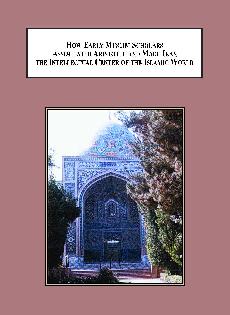This is our backup site. Click here to visit our main site at MellenPress.com
How Early Muslim Scholars Assimilated Aristotle and made Iran the Intellectual Center of the Islamic World. A Study of Falsafah

| Author: | Sadri, Farshad | |
| Year: | 2010 | |
| Pages: | 236 | |
| ISBN: | 0-7734-3716-9 978-0-7734-3716-6 | |
| Price: | $179.95 | |
The author demonstrates how Falsafah(which linguistically refers to a group of commentaries by Muslim scholars associated with their readings of the Corpus Aristotelicum) in Iran has been always closely linked with religion. It also shows that after the introduction of Islamic falsafah (and the onset of the Corpus Aristotelicum in Baghdad in 899 AD), the blending of the new natural theology and the vibrant Iranian culture gave birth to a new making of intellectual sway which soon made Iran the center of falsafah (and sciences) in the Medieval world.
Reviews
“While Sadri’s monograph is written in an engaging, quasi-autobiographical style, still it is rich in philosophical exposition and insight coupled with a clearly developed explication of Islamic religious/philosophical thought in the Islamic Republic of Iran. In turn this is used to explain Iranian culture as it can be understood in contemporary analysis.” – Prof. Carl R. Hasler, Collin College
“The interdisciplinary approach allows [the author] to introduce a chronicle of his people that encompasses the dynamic growth of the intellectual and religious thought in the Middle East. A thoughtful study for scholars of comparative religion, Sadri juxtaposes Medieval Islam with Medieval Christianity, showing the philosophical foundations that distinguish these two contemporary religions.” – Prof. Linda Deaver, Kaplan University
“Taking as his point of departure the fate of Aristotle’s corpus in medieval Christianity and in medieval Islam, Sadri offers a masterful account of how the current status of Western and Iranian identity can be read through the palimpsest of a philosophical/religious recovery of Aristotle’s practical philosophy.” – Prof. Charles Bambach, University of Texas, Dallas
“The interdisciplinary approach allows [the author] to introduce a chronicle of his people that encompasses the dynamic growth of the intellectual and religious thought in the Middle East. A thoughtful study for scholars of comparative religion, Sadri juxtaposes Medieval Islam with Medieval Christianity, showing the philosophical foundations that distinguish these two contemporary religions.” – Prof. Linda Deaver, Kaplan University
“Taking as his point of departure the fate of Aristotle’s corpus in medieval Christianity and in medieval Islam, Sadri offers a masterful account of how the current status of Western and Iranian identity can be read through the palimpsest of a philosophical/religious recovery of Aristotle’s practical philosophy.” – Prof. Charles Bambach, University of Texas, Dallas
Table of Contents
Foreword
Acknowledgments
Introduction
1. Commentaries on Aristotle
2. Commentaries on Aristotle and Islam
3. Commentaries on Islam
4. Commentaries on Islam and Iran
5. Commentaries on Iran
Endnotes
Bibliography
Index
Acknowledgments
Introduction
1. Commentaries on Aristotle
2. Commentaries on Aristotle and Islam
3. Commentaries on Islam
4. Commentaries on Islam and Iran
5. Commentaries on Iran
Endnotes
Bibliography
Index
